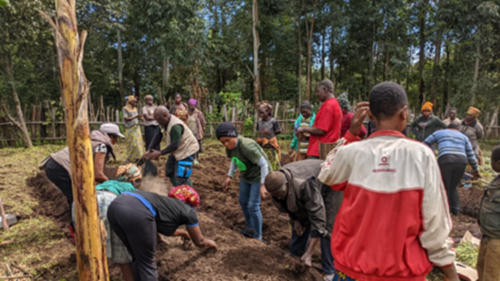Two humanitarian staff recount their two-day road trip in the Northwest conflict-stricken region of Cameroon to establish a sweetpotato demonstration plot to be used later to feed schoolchildren in the few schools still operational. This is part of an initiative seeking to help localize humanitarian assistance in DRC and Cameroon using existing local crops for food security and income generation.
“We embarked on a journey from Bamenda to Oku with the hope that the road would be unblocked, but alas, pathways remained obstructed due to roadblocks caused by ghost towns imposed by separatist groups,” said Karen Tatah, a humanitarian staff at Nascent Solutions, an NGO committed to fostering a self-reliant and poverty-free Africa, operating in the Northwest region of Cameroon.

“Subsequently, we had to use a longer route covering an estimated distance of 459 kilometers, traversing through seven towns, enduring more than 36 hours of travel by car and motorbikes to finally arrive at Oku.”
The long risky trip aimed to meet a group of 20 parents to establish a demonstration plot for two orange-fleshed sweetpotato (OFSP) varieties, a type of sweetpotato rich in beta carotene, the precursor of Vitamin A. A week earlier, they had received some 600 cuttings and wanted to avoid the materials getting spoiled and ensure the timely availability of planting materials when schools resumed in September.
“We provide daily lunch and periodic take-home rations using food commodities provided by the United States Department of Agriculture and from school gardens and community farms as part of our Home-Grown School Feeding program to 240 communities in four regions across Cameroon,” said Charles Nche, a Humanitarian Officer who was part of the Oku expedition. “This innovative approach would help us introduce the highly nutritious OFSP roots into their lunch meals and therefore improve children’s attentiveness and attendance.”
Strengthening capacities for quality plantain and sweetpotato seed entrepreneurship in humanitarian settings
A week prior to this expedition, Karen Tatah, along with 17 other participants from regions affected by violent crises in the country, attended a training program held in Bandjoun, West Cameroon, on improved techniques for sweetpotato and plantain rapid seed multiplication, crop diseases and basic business skills in humanitarian settings.

“In 2018, I was kidnapped twice, and my residence burnt. Thereafter, I fled to Foumbot with my family,” said Vincent Ndimanjeh, a representative of the IDP groups in Foumbot. “Leading Internally Displaced People (IDP), I carried out the registration of 2,400 IDPS in Foumbot in 22 villages. With the introduction of the sweetpotato/plantain seed production and multiplication, three groups have been formed and are currently trying to legalize their existence. Due to the vastness of the Foumbot subdivision, we have one centralized demo plot and five small units strategically placed. During our monitoring exercise two weeks after, we achieved an 85% survival rate for the vines that had been planted.”
At the culmination of the week-long training, each participant received two different types of sweetpotatoes — 220 EJUMULA and 390 VITA OFSP cuttings — to establish demonstration plots that will become a source of food and income.

“In the Far North, food insecurity is distinctly evident. Thus, with all the knowledge acquired from this training, it is important that we introduce RTBs into our humanitarian interventions, given their nutritional value, ease of farming, and production cycle,” said Roland Palaï, an agronomist representing INTERSOS, a relief organization offering protection, food security, water and hygiene, and health assistance to IDPs.
Piloting a localized response to humanitarian crises
The initiative aims to pilot localized responses to humanitarian crises by building on the improvement of locally existing food systems. So far in Cameroon, six demo plots have been established in Oku, Ekona, Bandjoun, Bamenda, and Bambui while subsequent ones will be set up at the sub-divisional level once more vines are harvested. Since the June training of trainers, three regional feedback sessions have already been organized in Northwest and Far North regions to cascade the knowledge acquired to more locally affected communities.
The interventions in Cameroon and the Democratic Republic of the Congo (DRC) are part of the #Tools4SeedSystems project, funded by USAID’s Bureau for Humanitarian Assistance (BHA), and executed by the International Potato Center (CIP) in collaboration with the International Institute of Tropical Agriculture, the Alliance of Bioversity and CIAT, Wageningen University and Research, and the University of Florida.
Disclaimer and acknowledgments This activity was made possible through support provided by the Bureau for Humanitarian Assistance, U.S. Agency for International Development, under the terms of Award No. BHA 720BHA22IO00136. The opinions expressed in this event are those of the authors and do not necessarily reflect the views of the US Agency for International Development. This activity was made possible through support from CGIAR Seed Equal Initiative. We thank all donors and organizations which globally support its work through their contributions to the CGIAR Trust Fund.
